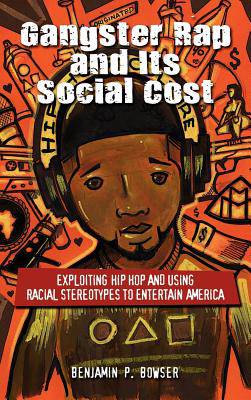
- Retrait gratuit dans votre magasin Club
- 7.000.000 titres dans notre catalogue
- Payer en toute sécurité
- Toujours un magasin près de chez vous
- Retrait gratuit dans votre magasin Club
- 7.000.000 titres dans notre catalogue
- Payer en toute sécurité
- Toujours un magasin près de chez vous
Gangster Rap and Its Social Cost
Exploiting Hip Hop and Using Racial Stereotypes to Entertain America
Benjamin P Bowser
Livre relié | Anglais
156,45 €
+ 312 points
Description
Rap music and its gangster rap variant are now far too important and influential in American life to be ignored by the general public and research communities alike. Artists and promoters alike have made a number of questionable claims about the authenticity and impact of their music that have been taken for granted and not been critically assessed. Those who have written about from communications, music and cultural studies have provided an important but relatively fixed narrative that leaves the central claims and impacts of this entrepreneur unaddressed. It is in this context that the author Benjamin Bowser began studying hip hop and gangster rap precisely because the influence of this movement and music on African American adolescents HIV infection risk takers. At the same time, the frequent use of the N-word by gangster rappers has become a major unaddressed issue in civil rights that has also not been studied. Furthermore, an important reason to study these unaddressed issues is to not only better understand them, but to offer solutions to the problems they pose and to improve the quality of life of all involved. Within the rapidly growing literature on hip hop and gangster rap, Gangster Rap and Its Social Cost stands out from the rest because it provides a number of unique contributions. First, based upon a community case study, the author asserts that gangster rap has empowered white racists and, as a consequence, has reduced the quality of life and civil rights of listeners and non-listeners alike. Second, this book goes to great length to make a serious distinction between gangster rap and hip hop. Disentangling one from the other opens the door to a more focused and critical analysis of gangster rap and provides an outline of the unmet potential of rap in hip hop. Third, national surveys are used as evidence in the debate about the size and characteristics of the rap and hip hop listener audiences. There are some surprises here that should reframe the controversy on who listens to and buys rap music. Fourth, there is a first generation of psychological and social scientific research on rap music that is summarized through 2011. Finally, the problems in gangster rap are not inevitable and we do not have to live with them. They can be effectively addressed without attacking the civil liberties of gangster rappers or their corporate sponsors. Gangster Rap and Its Social Cost is must reading for young adults, parents, those who both enjoy and dislike rap music, and students in sociology, psychology, ethnic studies, communication, music, community studies and public health.
Spécifications
Parties prenantes
- Auteur(s) :
- Editeur:
Contenu
- Nombre de pages :
- 332
- Langue:
- Anglais
Caractéristiques
- EAN:
- 9781604978001
- Date de parution :
- 18-04-12
- Format:
- Livre relié
- Format numérique:
- Genaaid
- Dimensions :
- 152 mm x 229 mm
- Poids :
- 657 g







